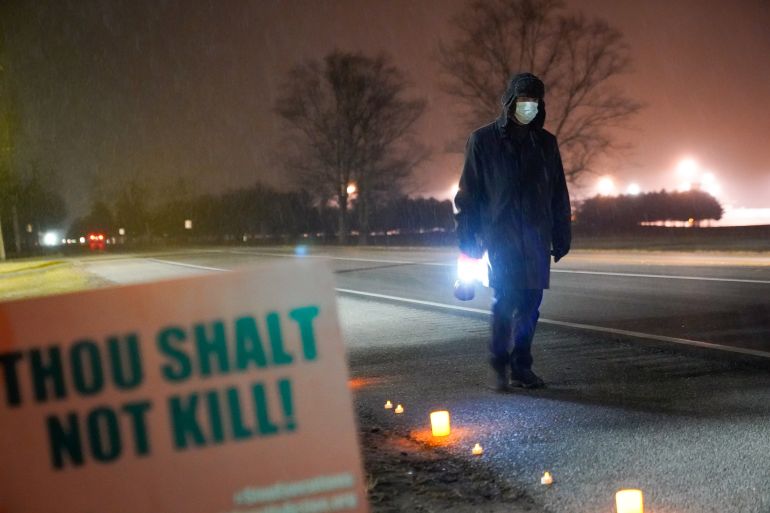Trump administration carries out 13th, final federal execution
Number of federal death sentences carried out under Trump since 2020 is more than the previous 56 years combined.

The US government carried out the 13th and final federal execution under President Donald Trump’s administration early on Saturday just days before President-elect Joe Biden takes office with a promise to end the death penalty.
Dustin Higgs, convicted in the killings of three women in a Maryland wildlife refuge in 1996, was the third to receive a lethal injection this week at the federal prison in Terre Haute, Indiana.
Keep reading
list of 4 itemsUS court overturns death penalty of Boston Marathon bomber
Should the death penalty be abolished worldwide?
Virginia governor backs move to end death penalty
Trump’s Justice Department resumed federal executions last year following a 17-year hiatus. No president in more than 120 years has overseen as many federal executions.
In his final words, Higgs sounded calm and defiant in the death chamber.
“I’d like to say I am an innocent man,” he said before lethal injections were administered, mentioning the three women by name. “I did not order the murders.”
Higgs, 48, was pronounced dead at 1:23am local time on Saturday (20:23 GMT on Friday).
Some of his victims’ relatives attended. “When the day is over your death will not bring my sister and the other victims back,” a statement from a victim’s sister said. “This is not closure, this is the consequence of your actions.”
Higgs’ older sister, Alexa Cave, could be heard sobbing uncontrollably from a separate witness room as Higgs died.
The number of federal death sentences carried out under Trump since 2020 is more than in the previous 56 years combined, reducing the number of prisoners on federal death row by nearly one-quarter.
None of the about 50 remaining men will likely be executed any time soon, with Biden signalling he will end federal executions.
The American Civil Liberties Union (ACLU) called the execution of Higgs the end of a “cruel, inhumane and lawless” spree by the federal government.
“President-elect Joe Biden has pledged to end the federal death penalty. He must honour that commitment,” Cassandra Stubbs, director of ACLU’s Capital Punishment Project, said.
The only woman on death row, Lisa Montgomery, was executed on Wednesday for killing a pregnant woman, then cutting the baby out of her womb and claiming it as her own.
She was the first woman executed in nearly 70 years.
Execution during transition
Not since the waning days of Grover Cleveland’s presidency in the late 1800s has the US government executed federal inmates during a presidential transition, according to the Death Penalty Information Center.
Cleveland’s was also the last presidency during which the number of civilians executed federally was in the double digits in one year, 1896, during Cleveland’s second term.
In October 2000, a federal jury in Maryland convicted Higgs of first-degree murder and kidnapping in the killings of Tamika Black, 19; Mishann Chinn, 23; and Tanji Jackson, 21.
His death sentence was the first imposed in the modern era of the federal system in Maryland, which abolished the death penalty in 2013.
Higgs’ lawyers argued it was “arbitrary and inequitable” to execute Higgs while Willis Haynes, the man who fired the shots that killed the women, was spared a death sentence.
The federal judge who presided over Higgs’s trial two decades ago said he “merits little compassion”.
“He received a fair trial and was convicted and sentenced to death by a unanimous jury for a despicable crime,” US District Judge Peter Messitte wrote in a December 29 ruling.
In a statement after the execution, Higgs’s lawyer, Shawn Nolan, said his client spent decades on death row helping other inmates and “working tirelessly to fight his unjust convictions”.
“The government completed its unprecedented slaughter of 13 human beings tonight by killing Dustin Higgs, a Black man who never killed anyone, on Martin Luther King’s birthday,” Nolan said.
“There was no reason to kill him, particularly during the pandemic and when he, himself, was sick with COVID that he contracted because of these irresponsible, super-spreader executions.”
Petition for clemency
Higgs’s December 19 petition for clemency argued he had been a model prisoner and dedicated father to a son born shortly after his arrest.
Higgs had a traumatic childhood and lost his mother to cancer when he was 10, the petition said.
“Mr Higgs’s difficult upbringing was not meaningfully presented to the jury at trial,” his lawyers wrote.